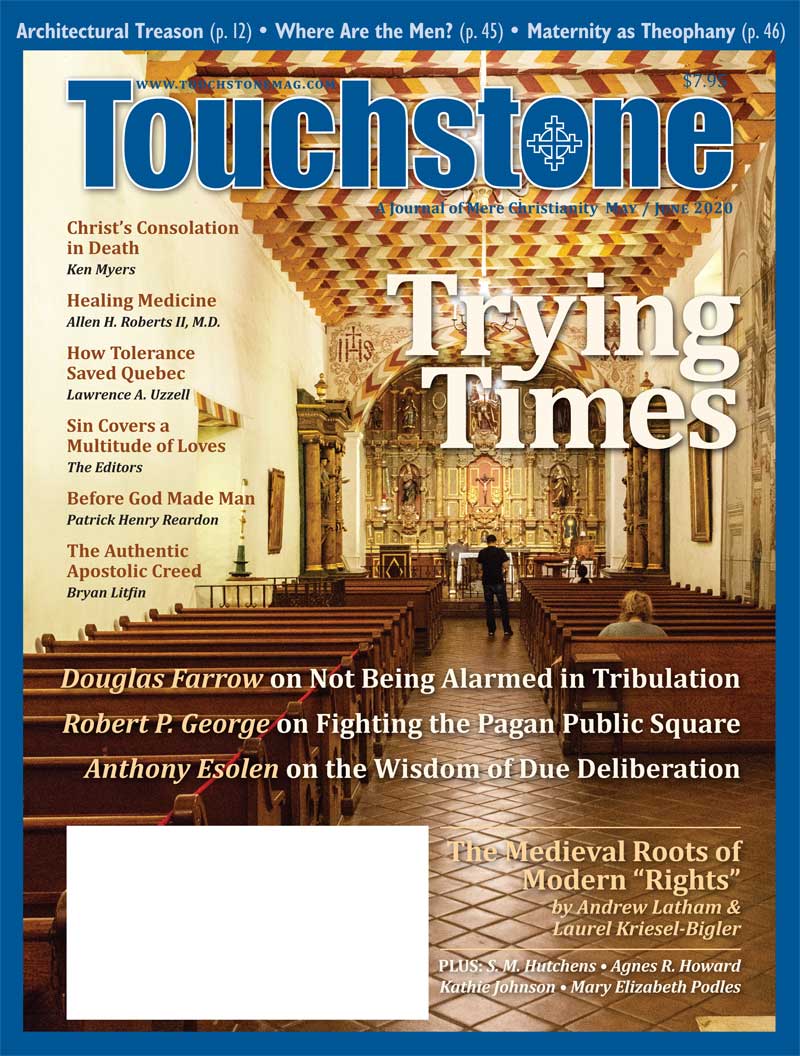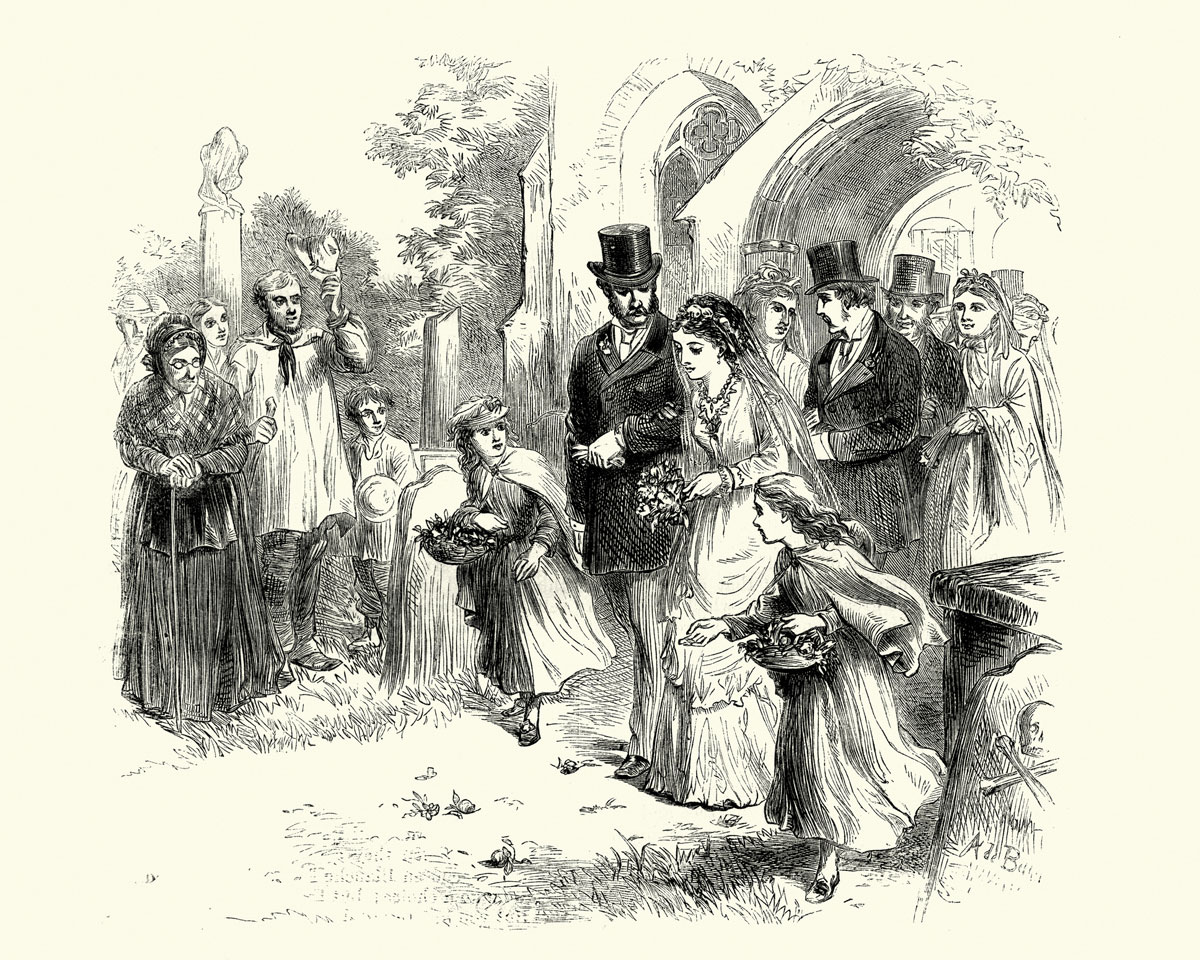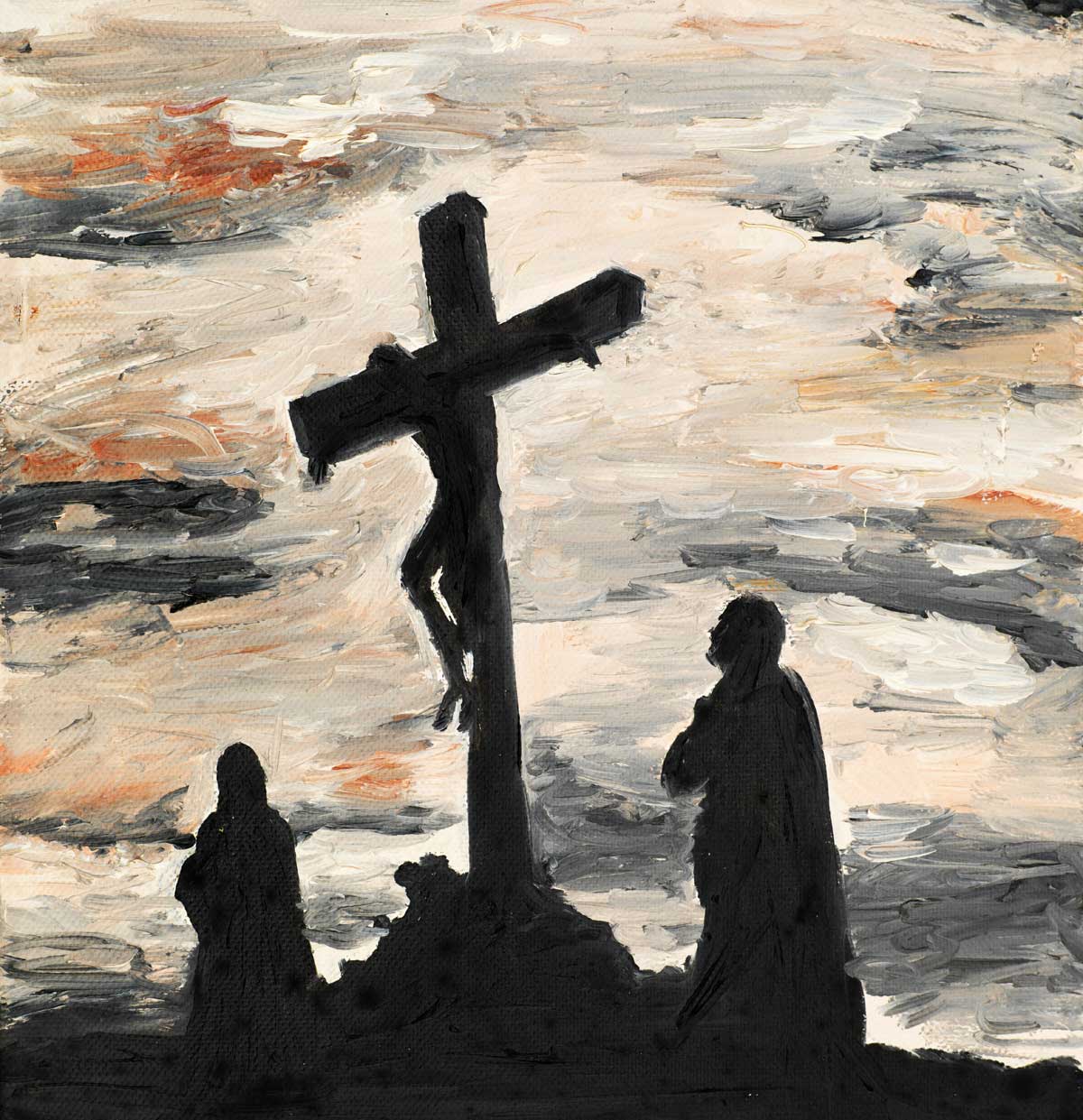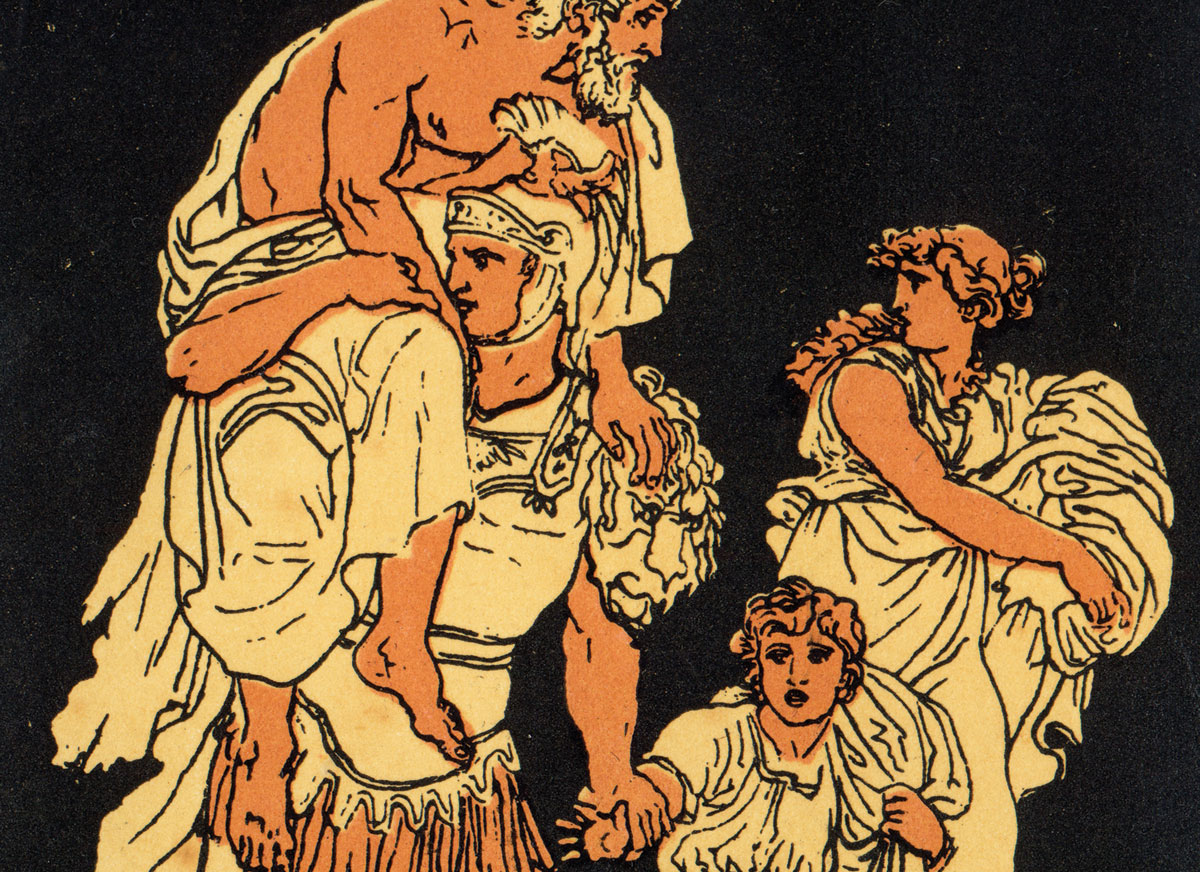Editorial
The Fog of Love
Sin Covers a Multitude of Loves
Peter Buttigieg, Democrat candidate for the presidency, has said that if Jesus were among us today, he would surely approve of the relations that Buttigieg and his sexual partner enjoy, because Jesus was about love, and love, as everyone knows, makes the world go round.
And round, and round, as Scripture confirms. Said Amnon about his own sister, "I love Tamar," and his friend Jonadab played the procurer accordingly (2 Sam. 13:4). That rape caused implacable enmity between Amnon and his half-brother Absalom, with terrible consequences for their father David and his kingdom. And Solomon "loved many strange women, together with the daughter of Pharaoh," and those many wives "turned away his heart after other gods" (1 Kings 11:1,4). But God punished that gentle and all-are-welcome apostasy by dividing the kingdom north and south.
We enjoy having our predilections slicked and oiled with flattery: "The prophets prophesy falsely, and the priests bear rule by their means; and my people love to have it so" (Jer. 5:31). Babylon was soon to fall upon that self-satisfied and enlightened people. The women of Judah fell in fashionable love with the fertility gods of their neighbors. Says Ezekiel: "Then he brought me to the door of the gate of the Lord's house which was toward the north; and behold, there sat women weeping for Tammuz" (Ezek. 8:14). Milton puts that scene nicely:
[T]he Love-tale
Infected Sion's daughters with like heat,
Whose wanton passions in the sacred Porch
Ezekiel saw, when by the Vision led
His eye surveyed the dark Idolatries
Of alienated Judah. (Paradise Lost, 1.452–457)
Our wickedness is made no better for our being committed to it: "And this is the condemnation, that light is come into the world, and men loved darkness rather than light, because their deeds were evil" (John 3:19). "Amor condusse noi ad una morte," says Francesca in the circle of the lustful in Dante's hell, referring to herself and her illicit lover: "Love led us to one death" (Inferno 5.106). Amor meus, pondus meum, said Augustine: Love is the weight that tosses us in one direction or another. It can toss us to heaven or toss us to hell.
Grasping the Good
"You are using the word love in equivocal senses," someone may object. "We are talking about the genuine article, and not about lust." Lust, affection, friendship, sexual desire, charity—the word love covers a multitude of passions, many of them present in the same person at the same time. But that is precisely why we fallen human creatures must not allow ourselves to be fooled by a word or a feeling. We do not know how to love. So we must not interpret Scripture according to our flailing and uncertain passions, but instead permit Scripture to put those passions in order. We must not say, "I am all right with the Lord, because I experience what is called love." We must say, "Unless the Lord sets my soul in order, I shall not know what love really is"—love, as when the purest of the evangelists, John, says, "God is love" (1 John 4:8).
We may say that love is at least what the wisest of the pagans held it to be, benevolence, to wish well for another, and we may look to the Lord for a certain measure of support: "But I say unto you, Love your enemies, bless them that curse you, do good to them that hate you, and pray for them which despitefully use you" (Matt. 5:44). But when we ask what it means, specifically, to "do good," the Lord refers us not to benevolent feelings but to the boundless mercy of God, who "maketh his sun to rise on the evil and on the good, and sendeth rain on the just and on the unjust," and to his perfection, his holiness: "Be ye therefore perfect, even as your Father which is in heaven is perfect" (Matt. 5:45, 48).
In our state, we do not grasp fully or surely what the good is; and if in these matters we Christians set aside the revealed word of God, we are at best like bad surgeons with good intentions. We can saw and cut and love the patient to death. At the worst, we have no desire to learn humbly how to distinguish good from evil, but we call good what seems good to us, like the sad lost souls of the Israelites in the days of the judges, when "every man did that which was right in his own eyes" (Judg. 21:25).
Jesus' Specifics
At this point, those who say they follow Christ but who defend the status quo—for that is what it is, as we are but following the premises of the sexual revolution to their inevitable end—may concede that we can learn from Scripture what is good, but not to distinguish one kind of sexual action from another. We are told that Jesus did not consider sexual sins to be the worst of all. He pardoned the woman caught in adultery. He associated with tax collectors and harlots. He reserved his most fiery condemnations for the smug and self-righteous.
Bits and scraps of the truth, there. Jesus numbered adultery, fornication, and lasciviousness among the sins that "come from within, and defile the man," like excrement (Mark 7:20–23). The prodigal son wasted his inheritance meta pornon, says his elder brother—on harlots, or loose women; it is not necessarily sex for a fee (Luke 15:30). We are warned against being like those seeds cast among thorns, hearing and accepting the word of God, but growing up choked with "cares and riches and pleasures of this life" (Luke 8:14).
When Jesus requires an exemplar of astonishing stupidity and wickedness, he turns to Tyre and Sidon, and to Sodom and Gomorrah (Matt. 11:20–24). We should attend to the specifics. Tyre was the grand maritime city of the sea-faring Phoenicians, "a merchant of the people for many isles," saying, "I am of perfect beauty" (Ezek. 27:3) and "I am a God, I sit in the seat of God, in the midst of the seas" (28:2). Thus do self-worship and an international reputation for wealth go merrily along with the Phoenician fertility cults, but Ezekiel warns the men of Tyre that destruction will come: "The merchants among the people shall hiss at thee; thou shalt be a terror, and never shalt be any more" (27:36).
As for Sodom and Gomorrah, we know what their defining sin was. Or we should know. They who wish very much not to see what is before their eyes say that according to Ezekiel, their sin had nothing to do with unnatural sex: "Behold, this was the iniquity of thy sister Sodom, pride, fullness of bread, and abundance of idleness was in her and in her daughters, neither did she strengthen the hand of the poor and needy" (16:49). They do not consider the next verse, which is the climax of the condemnation: "And they were haughty, and committed abomination before me" (16:50). The Hebrew for abomination suggests what stinks with corruption, and it is used for the ritually unclean or disgusting, and for a range of wicked things, including idolatry, child-sacrifice (Deut. 12:31), and sexual perversions (Lev. 18:22).
It is grimly amusing to see apologists for homosexual deeds appeal to one verse from Ezekiel as a proof-text, dislocating it from the rest of the prophet's harangue against the whoredoms of Israel, and from the very account to which Ezekiel refers. For the destruction of Sodom must be read in the context of the whole of Genesis, which is a saga of what goes wrong for man as soon as he heeds the words of the serpent, "Ye shall be as gods" (Gen. 3:5). Man is afflicted in the intellect whereby he bears the image and likeness of God, and becomes like the beasts, or worse than the beasts. His passions go wild. Even among good men and women they are unruly, and confusion reigns in the intimate sphere of family life.
Need I mention every instance in Genesis of sexual chaos and misery? Lot's daughters, Potiphar's wife, the rivalry of Rachel and Leah, Sarah's jealousy, Reuben's bedding down with his father's concubine, polygamy bringing a lot of drama in its train and none of it pleasant, the rape of Dinah, Ham's contempt for his naked father Noah—what does a merely inhospitable Sodom have to do with all of that? What does a welcome wagon have to do with the "begats," with numbering the generations of men, or with God's promise to Abraham's seed? It is as if we were to read Moby Dick and miss the sea and the whale.
Created Reality at Stake
Tyre and Sodom are more alike than unlike, as idolatry and abomination go hand in hand. "But perhaps," someone may say, "Jesus used those names only as names, and we are not meant to think of the specifics." Jesus was not known to use words lightly. This objection returns to the last best wish of the sexual conformists, the stuck-in-mud progressives, that Jesus simply did not care about such sins. But what is at stake? Not simply a set of rules regarding sexual behavior. The whole created order is at stake, and with it, the person of the Creator. Let us see why that is so.
When the scribes and the Pharisees attempted to enlist Jesus in one faction or another regarding the question of divorce, our Lord, on his own authority as the Son of God, reached back behind the law of Moses to return to man's sight the intention of the Father from the beginning. "Have ye not read," said he, "that he which made them at the beginning made them male and female, and said, For this cause shall a man leave father and mother, and shall cleave to his wife: and they twain shall be one flesh?"
Jesus here is not interested in feelings, or in any juridical criteria for justifying divorce. He appeals to created reality. "Wherefore," he says pointedly, "they are no more twain, but one flesh. What therefore God hath joined together, let not man put asunder" (Matt. 19:4–6). The question is not one of personalities, or cultures, or political structures, but of fact. Man and woman are for one another. When they unite in marriage—for Jesus is not talking about that bad impostor of marriage which is fornication—they do in fact become one flesh. Male and female make sense only in relation to one another. "It is not good that the man should be alone," says God, for none of the beasts of the field was a fit companion for Adam. So he goes on to fashion not a parallel to Adam, a mere friend, but the first woman (Gen. 2:18). At which Adam bursts forth in praise and happy gratitude: "This is now bone of my bones and flesh of my flesh: she shall be called Woman, because she was taken out of Man" (2:23). Those are the first human words reported in Scripture.
The Lord who forbids divorce, which every culture has accepted, referring us back to the Father's will in the beginning in making us male and female, can by no reasonable interpretation be made to smile upon sodomy. In these things as in others, he raises our sights from the law of Moses to its purification and fulfillment; no more concessions to the hardness of our hearts.
Signs of Deep Disorder
We in our time, because of our culture, or whatever residue of it we may call by that name, and because of our politics, which wavers between the murderous insanity of twentieth-century atheism and the skitters of social fads sold by mass media and mass schooling, try our hardest not to feel the power of the first Adam's words while he was yet sinless, words echoed by the second Adam himself, who is one with the Father. We are not, as people sometimes suppose, obsessed with sex. We have made a drab and dreary world of things, and so we turn to the last green field nearby, the human body and the pleasures we can procure by it. But such use of the body as pleasure-mechanism comes at a dreadful cost, exacted in many forms. The saddest of all, perhaps, is that we lose a sense of the goodness and beauty of sexual being, male and female, male for female and female for male; a sense that has always been marred and distorted by sin, but never so numbed as it is among us now.
For when man and woman come together in thoughtless fornication or in acts rendered deliberately sterile, they deny the fullness of reality; each sex wishes the other were, for the time being, less of what he or she is, less male, less female. That is but an instance of a general habit, as we are forbidden to take sex into account even when we are mustering up human bodies to stand against guns and bayonets on a battlefield. We are caught in a strange contradiction. The man who most keenly senses the peculiar goodness of womanhood is most likely to be accused of misogyny, precisely because he cannot forget that same womanhood when the politics around him demand it. The woman who is most grateful for the peculiar strengths of manhood is most likely to be accused of cowardice and treachery against her sex—against her sex, not as a sex, but as a political interest group.
The anthropological point I am making here is not mine at all. St. Paul made it long ago. What happens to fallen man, mired in sin? He experiences one inversion of Genesis after another. Men's hearts grow dark, and their imaginations vain—empty, of no avail. Instead of honoring the God who made them in his image, and who brought the beasts before Adam so that he might name them, they "changed the glory of the uncorruptible God into an image made like to corruptible man, and to birds, and four-footed beasts, and creeping things" (Rom. 1:23). That disorder, that contemptible submission of man to beast, is then reflected in their own bodies and their lusts. For they "changed the truth of God into a lie, and worshiped and served the creature more than the Creator," and that is why "God gave them up unto vile affections, for even their women did change the natural use unto that which is against nature: and likewise also the men, leaving the natural use of the woman, burned in their lust one toward another; men with men working that which is unseemly" (1:25–27).
Of course, man's sin is not predominantly sexual, but the sexual sins are so obviously bound to the order of creation, as one generation begets another, that they are signs of deep disorder. When men not only fail to fulfill the design of God, who said to the man and woman, "Be fruitful, and multiply, and replenish the earth, and subdue it" (Gen. 1:28), but by their actions heap contempt upon that design, they show how far they have strayed into error and madness. I am speaking not of individual souls, which God alone can read, but of a people generally forlorn, lost in a dry and lonely wilderness. Genesis is a veritable saga of the many ways in which man suffers in his sexual life the darkness and folly of sin, and in this sense indeed God visits the sins of the father and mother upon their children and their children's children. It is a fact we see before our eyes every day. Men and women have their flings, and children pay for them, sometimes with their lives.
More Than Morals
Essential to our recovery must be something more than a decision to return to the moral law. That decision is necessary but insufficient. Or perhaps the decision will fail in the end, unless we do what Pope John Paul II enjoined upon us: regain a sense of what it means to be male and female, and to be deeply grateful for each sex, as we would be grateful for a gift of such beauty that not all the whirling planets and stars can come up to it. Of course we cannot regain that sense so long as we follow tamely and timidly along with the flow of the mass river. Our yes to sexual being implies a no to sexual indifference; as our affirmation of the great good granted to us by our Creator implies a rejection of all actions that treat his creation with contempt, regardless of the conscious intentions of the actors. The reasons are inexorable.
And now, beaten from their scriptural lean-to, the apologists will say, "But what individuals do with their own bodies concerns them and not anyone else." It is a fundamentally antisocial thing to say, for, as I have often said in these pages, nothing short of divine worship so determines a culture as do its laws and customs regarding sex, marriage, and the raising of children. What has become, suddenly, of that tender conscience when it comes to hospitality? Why should children be sent into this vale of tears like shipwrecked mariners washed up on a beach, without the haven of a family, without a mother and a father at least, committed to one another forever, before God and man? Or why should those same children be sent later on to wander in a sexual wilderness, without any guidance as to where they are going or how they are to get there, with no acknowledged goal of mature manhood or womanhood, and vulnerable at every turn to the predatory, the vicious, the confused, the lonely, and the desperate?
Much love in that. Turn back, O man, and mend thy foolish ways.
Anthony Esolen is Distinguished Professor of Humanities at Thales College and the author of over 30 books, including Real Music: A Guide to the Timeless Hymns of the Church (Tan, with a CD), Out of the Ashes: Rebuilding American Culture (Regnery), and The Hundredfold: Songs for the Lord (Ignatius). He has also translated Dante’s Divine Comedy (Random House) and, with his wife Debra, publishes the web magazine Word and Song (anthonyesolen.substack.com). He is a senior editor of Touchstone.
subscription options
Order
Print/Online Subscription

Get six issues (one year) of Touchstone PLUS full online access including pdf downloads for only $39.95. That's only $3.34 per month!
Order
Online Only
Subscription

Get a one-year full-access subscription to the Touchstone online archives for only $19.95. That's only $1.66 per month!
bulk subscriptions
Order Touchstone subscriptions in bulk and save $10 per sub! Each subscription includes 6 issues of Touchstone plus full online access to touchstonemag.com—including archives, videos, and pdf downloads of recent issues for only $29.95 each! Great for churches or study groups.
Transactions will be processed on a secure server.
more on sex from the online archives
more from the online archives
calling all readers
Please Donate
"There are magazines worth reading but few worth saving . . . Touchstone is just such a magazine."
—Alice von Hildebrand
"Here we do not concede one square millimeter of territory to falsehood, folly, contemporary sentimentality, or fashion. We speak the truth, and let God be our judge. . . . Touchstone is the one committedly Christian conservative journal."
—Anthony Esolen, Touchstone senior editor













